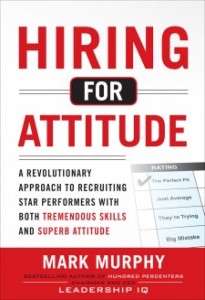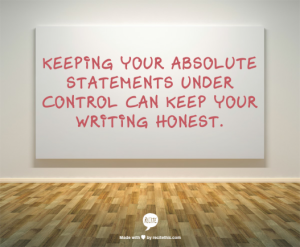In a recent article by ‘Leadership IQ’ it was discussed how job candidates who persistently use the words, ”always” and ”never” when answering questions run a very high risk of jeopardising their interview chances.
Why you ask? Because it is not painting a realistic picture and therefore, an untrue reflection of your future job predictability. After all, we are humans and essentially imperfect. To “never” and “always” do whatever it is you are always and never doing, does not leave much room for improvement, growth or flexibility.
The below text is an excerpt from the article referencing results and tips from the highly acclaimed book, ‘Hiring for Attitude’ by Mark Murphy. It discusses key tips on how to perform and behave in your interview, how to address certain questions and other great insights into successful interviewing from both the candidate and interviewer perspective.
So next time, prior to your big interview day, we suggest you prepare your answers, as we hope you already do, and draft some answers that demonstrate your realistic skills; including any weaknesses or drawbacks. Devise responses that reflect your strengths and how you use these to contribute and draft answers that reflect your development (weaknesses) areas and how you overcame these; or working toward overcoming these.
A common misconception is that, ‘candidates MUST not show any sign of failure or weakness during an interview’. This is incorrect! You can and should discuss any issues or challenges, for example missed deadlines, that you’ve encountered in any of your roles. Why you ask? So the interviewer can see how you overcame your challenge. What did you do? How did you do it? What was the outcome? There WILL always be challenges in every role; and by demonstrating some real examples you’ve encountered, this will show the recruiter how you can handle any of their impending challenges in the role. The issues is when you discuss any failures…and then not discuss how you solved the problem.
 “Job candidates who use words like “Never” and “Always” come across as more negative, insecure and are perceived as worse hires, compared with candidates who avoid those words.
“Job candidates who use words like “Never” and “Always” come across as more negative, insecure and are perceived as worse hires, compared with candidates who avoid those words.
A Leadership IQ study (featured in the Wall Street Journal) asked 1,400 professionals from a wide range of industries to answer 15 open-ended job interview questions such as “Could you tell me about a time you had to deal with a difficult co-worker.”
An 11-person panel comprising hiring managers, recruiters and human resources executives then sorted through the 20,500 responses and classified them according to potentially good and potentially bad hires. Then, using cutting-edge linguistic and textual analysis, Leadership IQ analyzed all those responses and made some shocking discoveries. Here are a few of those findings…
We discovered that the answers from candidates considered “bad hires” contain 103% more Absolutes (which are words like “never”, “always”, “absolutely”, “unquestionably”) than “good hires.”
Use of absolutes like “I always call the customer” and “I am unquestionably the best person on the team” can stem from insecurity, a need to show off, and/or black-and-white thinking and a lack of intellectual flexibility. When was the last time you experienced a situation that was “always” or “never” a certain way in the real world?
We also discovered that low performer answers contain 92% more words that signal negative emotions (e.g. “angry”, “aggravated”, “afraid”, “pessimistic”, “unhappy”).
When a candidate openly discusses negative emotions, it seems to raise questions about why they couldn’t find a more positive resolution. Saying “I’m aggravated about that part of my job, but I’m pretty pessimistic about whether it’ll ever change” does not indicate a proactive, coachable and go-getter type of attitude (characteristics that interviewers often like).“
For more tips and assistance with resume or interview coaching, contact Winning Edge Resumes today!

